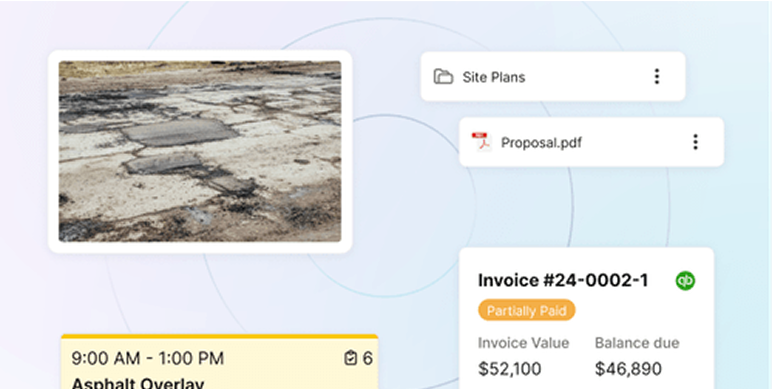Jobber Prices and Plans Breakdown: Is It Worth It in 2026?
Jobber prices start at $39 per month for solo contractors, with team plans ranging from $129 to $599 per month.
After testing Jobber's platform with multiple paving crews, I've watched contractors struggle with the climbing costs as their teams grow.
The platform works great for small field service teams, but paving contractors often hit limitations fast. Here's what you actually pay for with Jobber in 2026, which plan fits different business sizes, and why many paving contractors eventually switch to specialized platforms like OneCrew.
Jobber Pricing Plans Explained
Jobber plans are divided into three tiers designed for different business sizes. Individual plans start at $39/month, and team plans go up to $599/month, with discounts available if you pay annually. The platform also includes a 14-day free trial with no credit card required, so you can test everything risk-free.
Individual plans
Team plans
It's worth noting that Jobber also charges payment processing fees on top of your subscription: 2.9% + $0.30 for credit cards and 1% for ACH transfers.
These fees can add hundreds of dollars monthly to your actual Jobber costs. Additionally, some essential features like the Marketing Suite cost an extra $79/month on lower-tier plans.
Jobber Pricing Plans Breakdown
Each Jobber plan builds on the previous tier's features. Understanding what you get at each level helps you avoid paying for features you won't use.
Core: $39/month
What's included:
- Online booking and scheduling
- Professional quotes with service library
- Client manager and communication hub
- Mobile app access
- Jobber Payments integration
- Basic reports and dashboards
Best for: Solo contractors, side businesses, or anyone just starting out who needs basic scheduling and invoicing tools.
Pros:
- Affordable entry point for solo operators
- Clean interface that's easy to learn
- Professional quotes and invoices
Cons:
- Limited to one user
- No GPS tracking or QuickBooks sync
- Missing automation features
Connect: Individual ($119/month) vs. Team ($169/month for 5 users)
What's included:
- Everything in Core
- GPS location tracking
- QuickBooks Online integration
- Detailed financial reporting
- Automated appointment reminders
- Job forms and checklists
- Basic route optimization
- Time tracking
Individual Connect is best for solo operators or partnerships who need advanced features but work independently.
Team Connect is best for small crews (2–5 people) running multiple jobs daily who need better coordination.
Grow: Individual ($199/month) vs. Team ($349/month for 10 users)
What's included:
- Everything in Connect
- Job costing with profit tracking
- Two-way SMS messaging
- Automatic quote follow-ups
- Markup controls on quotes
- Location-based time tracking
- Advanced reporting
- Custom automation builder
- AI Receptionist available as an add-on
Individual Grow is best for high-volume solo operators, tracking profitability on complex jobs.
Team Grow is best for established businesses (4–10 employees) tracking profitability across multiple crews.
Plus (Team Only): $599/month for 15 users
What's included:
- Everything in Grow
- Marketing Suite included (normally $79/month)
- AI Receptionist
- Premium support and onboarding
- Advanced permissions and security
- Priority feature access
- Dedicated success manager
Best for: Large operations (10–15+ employees) needing comprehensive features, marketing tools, and premium support.
Pros:
- Marketing Suite included saves $79/month
- Best per-user value at full capacity ($40/user)
- Priority support for immediate help
- Premium white glove onboarding ensures success
Cons:
- Highest upfront cost
- No individual option available
- May include more than needed for mid-size teams
- Still charges $29 for users beyond 15
Which Jobber Plan Should You Choose?
Selecting the right Jobber plan depends on your team size, workflow complexity, and growth trajectory.
For Solo Operators (Individual Plans)
- Choose Core Individual ($39/month) if you: work completely solo, handle simple jobs, want basic scheduling and invoicing, and operate on a tight budget
- Choose Connect Individual ($119/month) if you: work alone but need GPS tracking, use QuickBooks Online, want automated reminders, and handle more complex workflows
- Choose Grow Individual ($199/month) if you: operate solo but track job profitability, need two-way texting, want automated follow-ups, and manage high-volume work
For Teams (Team Plans)
- Choose Connect Team ($169/month for 5 users) if you: Manage 2–5 team members, need GPS tracking for crews, use QuickBooks Online, and want automated reminders
- Choose Grow Team ($349/month for 10 users) if you: Track job profitability across projects, manage 4–10 employees, need two-way texting, and want automated sales follow-ups
- Choose Plus Team ($599/month for 15 users) if you: Run 11- to 15-person (or more) operations, want included marketing tools, need premium support, and require enterprise features
Note: The quote calculator in Jobber works for basic service pricing, but falls short for complex paving projects. You can't import blueprints, measure areas accurately, or calculate material quantities based on square footage.
Is Jobber Worth the Cost?
Jobber delivers value for small service businesses that fit its generalist model. The platform streamlines basic operations and helps teams look professional. However, contractors often outgrow Jobber's capabilities or find the per-user pricing becomes unsustainable.
The real cost of Jobber goes beyond the advertised prices. Once you factor in payment processing fees, additional users at $29 each, and add-ons like the Marketing Suite, a small team can easily spend $300–400 monthly.
For context, that's $3,600–4,800 annually for software that still won't handle complex project estimating or detailed takeoffs. Many contractors find themselves supplementing Jobber with additional tools, further increasing their software costs.
Jobber is worth it if you run quick service calls with simple pricing, manage residential maintenance or cleaning services, need basic scheduling without complex workflows, want something running in days not weeks.
Skip Jobber if you manage complex project-based work like paving, need detailed takeoff and estimating tools, track multiple crews on large job sites, or want industry-specific features that understand your trade
Note: For a detailed comparison of features and workflows, check out our Jobber reviews article.
Jobber Alternatives and Pricing Comparison
Jobber prices competitively against general field service platforms, but lacks the specialized features many contractors need.
Note: Explore how Jobber compares to accounting platforms in our Jobber vs. QuickBooks analysis.
OneCrew vs. Jobber: Which Should You Choose?
OneCrew and Jobber serve different contractor segments. Understanding these differences helps you pick the right platform.
- OneCrew is better for asphalt and concrete contractors, project-based paving work requiring takeoffs, multi-phase jobs with complex estimating, and crews needing material and labor calculations.
- Jobber is better for general field services, quick residential jobs, simple quote-to-cash workflows, and teams wanting basic features fast.
- Use both if you run mixed operations with both quick service calls and larger paving projects (though this rarely makes financial sense).
Note: Learn more about how these platforms compare in our Jobber vs. Housecall Pro breakdown.
Jobber Pricing: My Verdict
Jobber prices work for small teams doing simple jobs. The platform delivers on its promise of easy scheduling and professional invoicing. But once you add users, need job costing, or want marketing features, you're looking at $200 to $600 monthly.
That's when specialized platforms built for your trade start making more sense. Paving contractors especially find better value with purpose-built tools that understand project-based workflows.
Note: For more platform comparisons, read our comprehensive Jobber alternative guide.
Get Started with OneCrew
OneCrew combines the project management features you need with specialized tools that understand paving workflows. Purpose-built for paving contractors, OneCrew handles everything from PDF takeoff to customer payments in one platform designed around how you actually work.
Here's why contractors choose OneCrew over generic Jobber prices and features:
- Built for paving contractors: OneCrew understands asphalt and concrete workflows, from site mapping to crew dispatch and job costing.
- Faster setup and easier training: Contractors start using OneCrew in days, with templates designed for real paving workflows.
- Configurable estimating: Build detailed estimates with cost calculators, material databases, and automated labor calculations.
- Fewer tools to manage: OneCrew replaces estimating apps, crew calendars, customer communication, and invoicing in one workspace.
- Integrated customer portal: Clients view and approve proposals, share photos, message your team, and pay invoices in one place.
Book a free demo today to see how OneCrew can simplify your operations from lead to invoice.
FAQs
1. How much is Jobber per month?
Jobber costs between $39/month and $199/month for Individual Plans, and between $169/month and $599/month for Team Plans. Solo operators can choose Individual Core ($39), Connect ($119), or Grow ($199) plans. Teams should opt for Connect Teams ($169 for 5 users), Grow Teams ($349 for 10 users), or Plus ($599 for 15 users).
2. What's included in each Jobber plan?
Each Jobber plan includes core features like scheduling and invoicing, CRM, and quoting. Connect adds GPS tracking and QuickBooks sync, Grow includes job costing, automatic time tracking, and two-way texting.
3. Does Jobber have a free trial?
Jobber offers a 14-day free trial of its most powerful plan; the Grow Plan. No credit card required. You get full access to test features before choosing a paid plan.
4. How does Jobber pricing compare to QuickBooks?
Jobber prices start higher than QuickBooks but include operational features QuickBooks lacks. Jobber handles scheduling, dispatching, and field management starting at $39/month, while QuickBooks focuses purely on accounting.
5. Can Jobber replace QuickBooks entirely?
Jobber cannot fully replace QuickBooks for accounting. Jobber syncs with QuickBooks Online but lacks comprehensive accounting features like payroll, tax filing, and detailed financial reporting.
6. What's the best Jobber plan for small businesses?
Connect at $169/month works best for most small businesses. You get 5 users, GPS tracking, and QuickBooks integration without the steep price jump to Grow.
7. Does Jobber offer annual discounts?
The annual billing option saves up to 40% on the total cost compared to paying monthly. Core drops from $39 to $29 monthly when billed annually.
8. Are Jobber prices per user or flat?
Jobber uses mixed pricing. Core charges per individual user, while Connect and Grow include multiple users (5 and 10, respectively) with extra users costing $29/month each.


